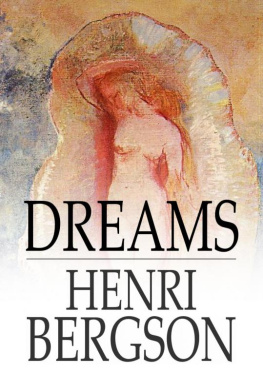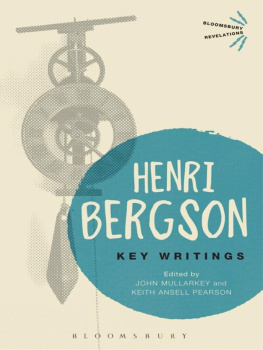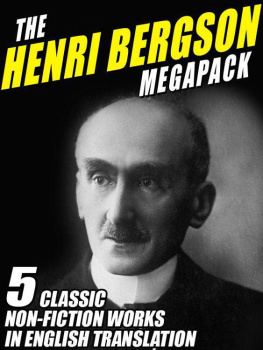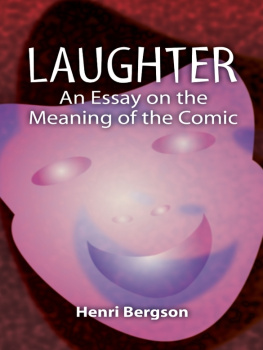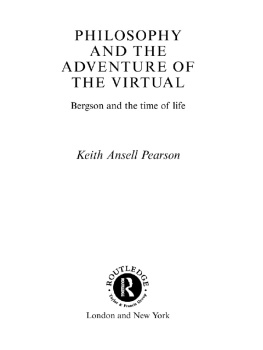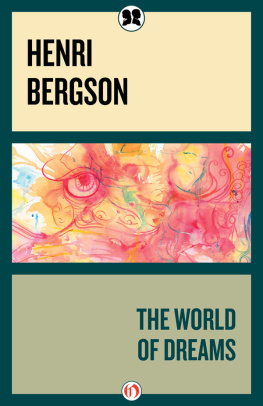Henri Bergson - Dreams
Here you can read online Henri Bergson - Dreams full text of the book (entire story) in english for free. Download pdf and epub, get meaning, cover and reviews about this ebook. year: 2009, publisher: The Floating Press, genre: Science. Description of the work, (preface) as well as reviews are available. Best literature library LitArk.com created for fans of good reading and offers a wide selection of genres:
Romance novel
Science fiction
Adventure
Detective
Science
History
Home and family
Prose
Art
Politics
Computer
Non-fiction
Religion
Business
Children
Humor
Choose a favorite category and find really read worthwhile books. Enjoy immersion in the world of imagination, feel the emotions of the characters or learn something new for yourself, make an fascinating discovery.
- Book:Dreams
- Author:
- Publisher:The Floating Press
- Genre:
- Year:2009
- Rating:4 / 5
- Favourites:Add to favourites
- Your mark:
- 80
- 1
- 2
- 3
- 4
- 5
Dreams: summary, description and annotation
We offer to read an annotation, description, summary or preface (depends on what the author of the book "Dreams" wrote himself). If you haven't found the necessary information about the book — write in the comments, we will try to find it.
Dreams — read online for free the complete book (whole text) full work
Below is the text of the book, divided by pages. System saving the place of the last page read, allows you to conveniently read the book "Dreams" online for free, without having to search again every time where you left off. Put a bookmark, and you can go to the page where you finished reading at any time.
Font size:
Interval:
Bookmark:
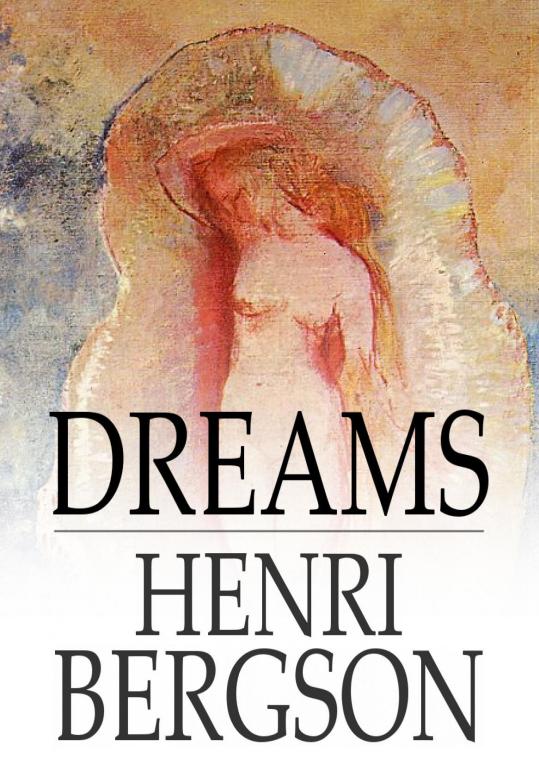

Dreams
From a 1914 edition.
ISBN 978-1-775410-82-9
2009 THE FLOATING PRESS.
While every effort has been used to ensure the accuracy and reliability of the information contained in The Floating Press edition of this book, The Floating Press does not assume liability or responsibility for any errors or omissions in this book. The Floating Press does not accept responsibility for loss suffered as a result of reliance upon the accuracy or currency of information contained in this book. Do not use while operating a motor vehicle or heavy equipment. Many suitcases look alike.
Visit www.thefloatingpress.com
Before the dawn of history mankind was engaged in the study of dreaming.The wise man among the ancients was preeminently the interpreter ofdreams. The ability to interpret successfully or plausibly was thequickest road to royal favor, as Joseph and Daniel found it to be;failure to give satisfaction in this respect led to banishment fromcourt or death. When a scholar laboriously translates a cuneiform tabletdug up from a Babylonian mound where it has lain buried for fivethousand years or more, the chances are that it will turn out either anastrological treatise or a dream book. If the former, we look upon itwith some indulgence; if the latter with pure contempt. For we know thatthe study of the stars, though undertaken for selfish reasons andpursued in the spirit of charlatanry, led at length to physical science,while the study of dreams has proved as unprofitable as the dreaming ofthem. Out of astrology grew astronomy. Out of oneiromancy hasgrownnothing.
That at least was substantially true up to the beginning of the presentcentury. Dream books in all languages continued to sell in cheapeditions and the interpreters of dreams made a decent or, at any rate, acomfortable living out of the poorer classes. But the psychologistrarely paid attention to dreams except incidentally in his study ofimagery, association and the speed of thought. But now a change has comeover the spirit of the times. The subject of the significance of dreams,so long ignored, has suddenly become a matter of energetic study and offiery controversy the world over.
The cause of this revival of interest is the new point of view broughtforward by Professor Bergson in the paper which is here made accessibleto the English-reading public. This is the idea that we can explore theunconscious substratum of our mentality, the storehouse of our memories,by means of dreams, for these memories are by no means inert, but have,as it were, a life and purpose of their own, and strive to rise intoconsciousness whenever they get a chance, even into thesemi-consciousness of a dream. To use Professor Bergson's strikingmetaphor, our memories are packed away under pressure like steam in aboiler and the dream is their escape valve.
That this is more than a mere metaphor has been proved by ProfessorFreud and others of the Vienna school, who cure cases of hysteria byinducing the patient to give expression to the secret anxieties andemotions which, unknown to him, have been preying upon his mind. Theclue to these disturbing thoughts is generally obtained in dreams orsimilar states of relaxed consciousness. According to the Freudians adream always means something, but never what it appears to mean. It issymbolic and expresses desires or fears which we refuse ordinarily toadmit to consciousness, either because they are painful or because theyare repugnant to our moral nature. A watchman is stationed at the gateof consciousness to keep them back, but sometimes these unwelcomeintruders slip past him in disguise. In the hands of fanatical Freudiansthis theory has developed the wildest extravagancies, and the voluminousliterature of psycho-analysis contains much that seems to the laymanquite as absurd as the stuff which fills the twenty-five cent dreambook.
It is impossible to believe that the subconsciousness of every one of uscontains nothing but the foul and monstrous specimens which they dredgeup from the mental depths of their neuropathic patients and exhibit withsuch pride.
Bergson's view seems to me truer as it is certainly more agreeable, thatwe keep stored away somewhere all our memories, the good as well as theevil, the pleasant together with the unpleasant. There may be nightmaresdown cellar, as we thought as a child, but even in those days we knewhow to dodge them when we went after apples; that is, take down a lightand slam the door quickly on coming up.
Maeterlinck, too, knew this trick of our childhood. When in the Palaceof Night scene of his fairy play, the redoubtable Tyltyl unlocks thecage where are confined the nightmares and all other evil imaginings, heshuts the door in time to keep them in and then opens another revealinga lovely garden full of blue birds, which, though they fade and die whenbrought into the light of common day, yet encourage him to continue hissearch for the Blue Bird that never fades, but lives everlastingly. Thenew science of dreams is giving a deeper significance to the trite wishof "Good night and pleasant dreams!" It means sweet sanity and mentalhealth, pure thoughts and good will to all men.
Professor Bergson's theory of dreaming here set forth in untechnicallanguage, fits into a particular niche in his general system ofphilosophy as well as does his little book on Laughter. With the mainfeatures of his philosophy the English-reading public is betteracquainted than with any other contemporary system, for his books havesold even more rapidly here than in France. When Professor Bergsonvisited the United States two years ago the lecture-rooms of ColumbiaUniversity, like those of the Collge de France, were packed to thedoors and the effect of his message was enhanced by his eloquence ofdelivery and charm of personality. The pragmatic character of hisphilosophy appeals to the genius of the American people as is shown bythe influence of the teaching of William James and John Dewey, whosepoint of view in this respect resembles Bergson's.
During the present generation chemistry and biology have passed from thedescriptive to the creative stage. Man is becoming the overlord of themineral, vegetable and animal kingdoms. He is learning to make gems andperfumes, drugs and foods, to suit his tastes, instead of depending uponthe chance bounty of nature. He is beginning consciously to adapt meansto ends and to plan for the future even in the field of politics. He hasopened up the atom and finds in it a microcosm more complex than thesolar system. He beholds the elements melting with fervent heat and heturns their rays to the healing of his sores. He drives the lightningthrough the air and with the product feeds his crops. He makes thedesert to blossom as the rose and out of the sea he draws forth dryland. He treats the earth as his habitation, remodeling it in accordancewith his ever-varying needs and increasing ambitions.
This modern man, planning, contriving and making, finds Paley's watch aslittle to his mind as Lucretius's blind flow of atoms. A universe woundup once for all and doing nothing thereafter but mark time is asincomprehensible to him as a universe that never had a mind of its ownand knows no difference between past and future. The idea of eternalrecurrence does not frighten him as it did Nietzsche, for he feels it tobe impossible. The mechanistic interpretation of natural phenomenadeveloped during the last century he accepts at its full value, andwould extend experimentally as far as it will go, for he finds it notinvalid but inadequate.
Font size:
Interval:
Bookmark:
Similar books «Dreams»
Look at similar books to Dreams. We have selected literature similar in name and meaning in the hope of providing readers with more options to find new, interesting, not yet read works.
Discussion, reviews of the book Dreams and just readers' own opinions. Leave your comments, write what you think about the work, its meaning or the main characters. Specify what exactly you liked and what you didn't like, and why you think so.

